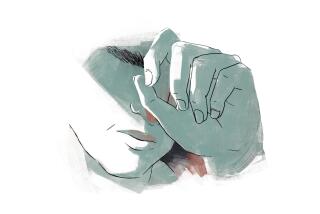Patients Find Haven From Loneliness at AIDS Center : Support: San Diego AIDS Adult Day Health Care Center provides physical therapy, counseling and companionship for those in need.
- Share via
At first, James LaMaster thought that the worst part of living with the HIV virus was watching his body deteriorate.
In the four years since he was found to have the virus, LaMaster, 48, has watched his skin erupt in painful shingles, listened as his voice hardened into that of an old man, and has spat out all his teeth.
But LaMaster eventually found the physical ordeals easy compared with the mental hurdles he had to overcome.
The most difficult part of dealing with the virus that causes AIDS was the constant anxiety and depression that he faced living alone. And because the illness confined him to the house, the emotions were accompanied by a sense of isolation and a need to escape.
“I am the type who liked to sit home and lick his wounds. You try to make yourself positive but one little thing will knock it out from under you,” LaMaster said. “This place gets me out of the house for the major part of the day and lets me be a part of something. Interaction with other people really changes my attitude and makes me realize that life does go on.”
LaMaster found his escape in the San Diego AIDS Adult Day Health Care Center, a 4-month-old health center designed to help HIV-infected people deal with boredom by getting out of the house and interacting with other people.
The center is the first of its kind in San Diego, providing social activities, psychological services and physical therapy for homebound AIDS and HIV-positive patients during the day, said Terry Cunningham, the center’s chief executive officer.
“Most people are home watching TV, not taking their medicine and just sitting around because they are anxious and depressed about having the disease,” Cunningham said. “We get people to come out, socialize and feel they can have a good quality of life, no matter how much time they have left.”
Plans for the center got underway about two years ago when Cunningham and other AIDS activists conducted a survey among San Diegans with the disease and found that while there were plenty of services available for people who were homebound or hospitalized, there were none available for those who were not bedridden.
The county is projected to have more than 3,500 cases of AIDS by the end of 1992, with more cases predicted to crop up among women, children and minorities, Cunningham said.
At about the same time, the state released a request for a proposal for an adult AIDS day-care center targeted to address the needs of those people, and Cunningham and his group were awarded the money.
With the help of the state and Alliance Healthcare Foundation, a local nonprofit group, the center set up shop at its Fifth Avenue location last November and now cares for about 15 adults, Cunningham said.
Patients pay about $60 a day for its services, but most of the bills are footed by Medi-Cal, Cunningham said.
Clients can come to the center for up to four hours a day to paint, exercise, create arts and crafts projects or enjoy recreational activities, Cunningham said. They get transportation to the center and a hot lunch.
A nurse administers medicines and offers nutritional counseling.
But most clients come to the center for company, something they may lack because they live alone or because AIDS has alienated them from family and friends. Here they can find someone who can sympathize with their fears and share their hopes.
The main recreation room at the center looks like a summer day camp--a collection of lanyards, puzzles, paintings, pipe cleaners and sparkles dotting every available windowsill and table surface.
At a central table, groups of people chat while fashioning crafts projects.
While they are here, worry is put on the back burner. There are plant holders to be woven, leather wallets to be bound and potholders to be made.
“The best part of being here is the companionship and being among other people that are going through the same things that I am,” said Jerry Duffy, who was diagnosed with AIDS two years ago. “I think this place helps my outlook on life. I have something to do and I feel like I am making a great contribution.”
More to Read
Sign up for Essential California
The most important California stories and recommendations in your inbox every morning.
You may occasionally receive promotional content from the Los Angeles Times.













